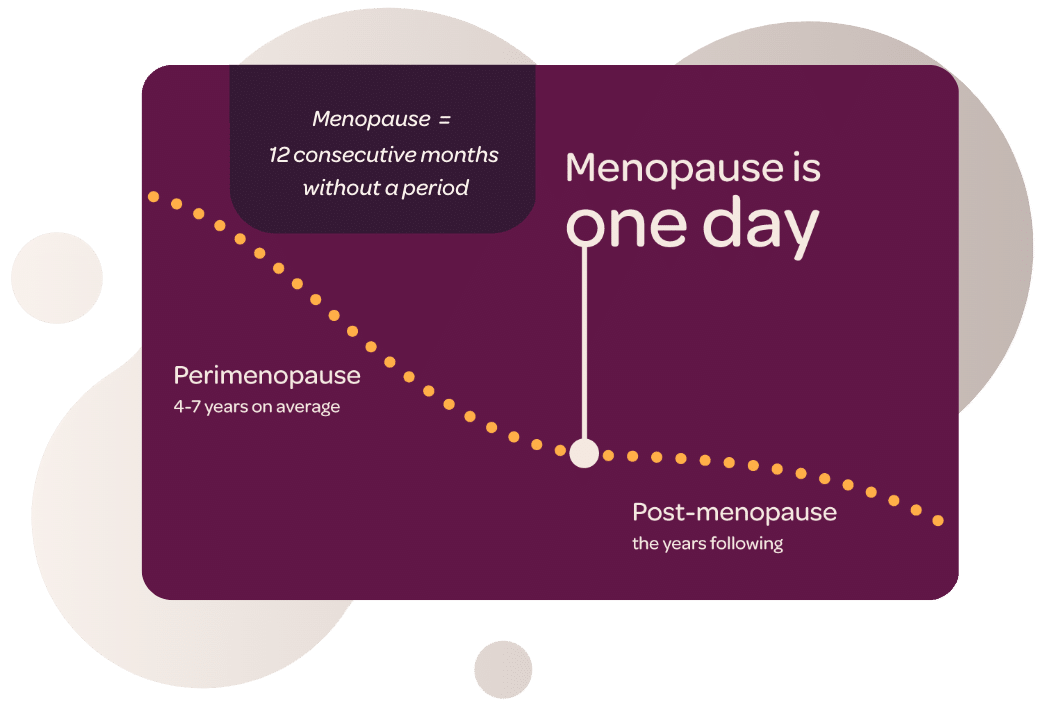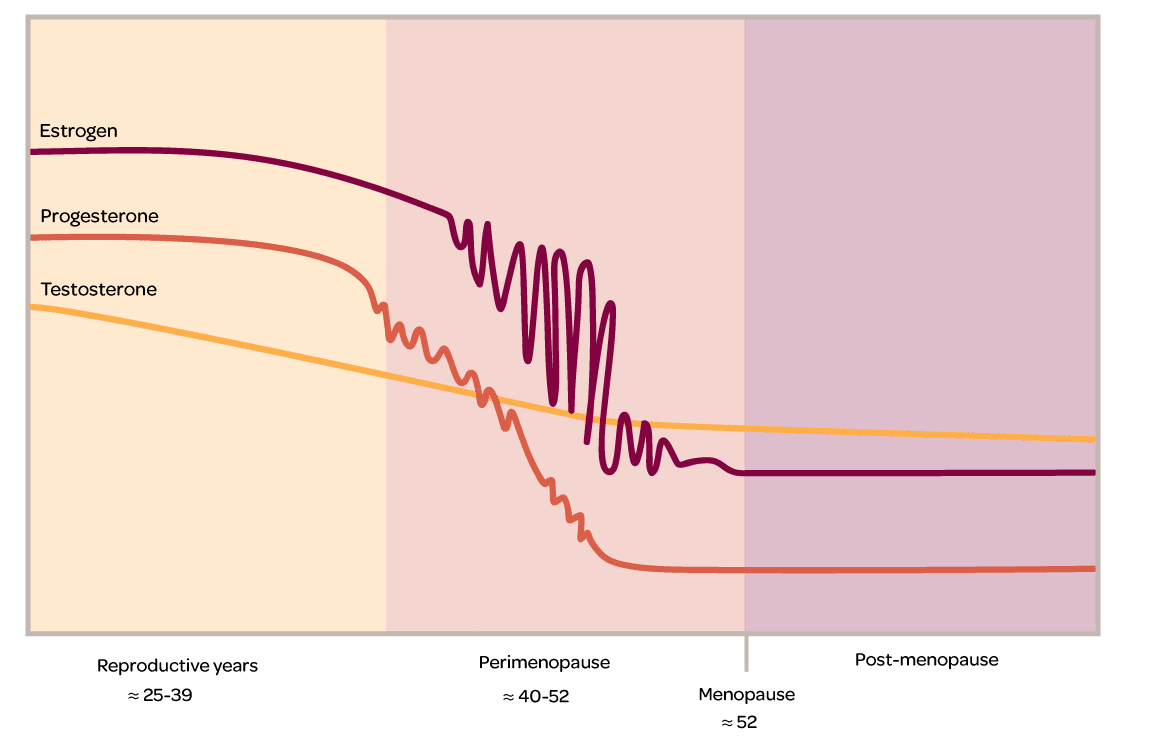
The first signs of menopause are the symptoms women experience during a period called perimenopause, which can start up to 10 years before menopause.
Since menopause is defined by not having a period for a year, most of the symptoms we associate with menopause (aka hot flashes) actually begin during perimenopause. At MiraKind, we believe perimenopause is a critical time for women to take control of their health and make choices to not only ease unpleasant symptoms but also reduce their risk of cancer.
For most women, perimenopausal symptoms start in their mid-40s and may include:
- Irregular periods
- Periods can be longer, shorter, heavier, lighter, and/or change in time between each cycle.
- Weight gain or difficulty losing weight
- Metabolism slows, which makes it harder to maintain a healthy weight.
- Hot flashes/night sweats
- Body temperature fluctuates resulting in a sudden feeling of heat that spreads across the body and can cause night sweats.
- Sleep disturbance/fatigue:
- Hot flashes and night sweats are the biggest culprits of sleep disturbances.
- Lower libido and vaginal dryness
- Changes in sex drive as well as vaginal dryness, caused by vaginal atrophy i
- Cognitive decline
- Inability to concentrate, brain fog, and/or changes in memory.
- Urinary weakness
- Pelvic floor weakens, which causes the urge to urinate more frequently or urinary leakage
- Mood changes
- Increase in irritability, anxiety and/or depression
What’s causing all these symptoms? Hormone changes!
Some of your hormones begin to change in perimenopause. Let’s take a look at what’s happening to your hormones as you age.

By the time you reach full menopause these hormones will be at their lowest levels since before puberty, and will stay there for the rest of your life.
Estrogen
- Estrogen is produced by your ovaries to maintain the reproductive system and menstrual cycle. During perimenopause, your estrogen levels begin to decrease, causing cycle changes and many of those perimenopausal symptoms.
Progesterone
- Progesterone is also produced by ovaries to help regulate the menstrual cycle, and levels decrease during perimenopause. Progesterone has a calming effect on the body, so the decline in this hormone can contribute to poor sleep, irritability, and anxiety.
Testosterone
- While at much lower levels than men, women also have testosterone. Levels decline as women age, which can impact libido, weight, and mood.
How do I know I’m perimenopausal?
Unfortunately, there is no test to determine whether you’re in perimenopause. You can have bloodwork done to check your hormone levels, however that may not tell the full story since your hormone levels are constantly changing.
So, look for the first signs listed above and if you have some of them and you’re around the right age, you’re most likely in perimenopause!
I’m perimenopausal, now what?
This transition is an ideal time to take control of your health. You can make choices to ease symptoms, and potentially to reduce your risk of cancer.
Menopausal Hormone Therapy (MHT), formerly Hormone Replacement Therapy (HRT), has had a bad rap since the early 2000s, after the W.H.I. study. However, most professionals now agree that for many women, MHT is a safe and effective treatment for symptoms during this phase of life. Professionals like the North American Menopause Society (NAMS) and co-author of Estrogen Matters, oncologist Avrum Bluming, have also pointed out some of the many benefits of MHT.
Also, we know from our research that for some women, like those with the KRAS-variant, MHT may actually reduce the risk of cancer. If you’re suffering from perimenopausal symptoms and/or if you have the KRAS-variant, speak to your doctor or OBGYN to learn about the benefits and any potential risks of MHT for you.
Discovered in 2006, the KRAS-variant is an inherited genetic variant associated with breast cancer,3 ovarian cancer,2 lung cancer,1 as well as other cancers,5,6 and the potential development of multiple cancers in the same individual.4,7 For women with the KRAS-variant, cancer may be prevented by maintaining estrogen levels, making perimenopause an important time to be tested for it.7 Learn more about KRAS-variant testing here.
A member of our board, Sara Rosenthal, shares how knowing her KRAS-variant status at this stage of her life has impacted her healthcare choices:
“I think the biggest impact on my own health has been that given I have an increased risk for breast cancer, I now get an annual MRI (which is more sensitive in detecting cancer, particularly in dense breasts like mine) in addition to a mammogram. Though I am not taking hormone replacement therapy yet, I also feel more comfortable advocating for HRT for myself with my doctor when I do start to have perimenopausal symptoms. Knowing my KRAS status means that I am that much more empowered as I approach menopause to take actions that will help mitigate my cancer risk.”
In summary, at MiraKind we believe that perimenopause is the perfect time for women to take charge of their health and practice advocating for themselves. Understanding what exactly perimenopause can look like and what is going on in your body are the first steps towards being comfortable advocating for the best personal health solutions.




Leave a Reply